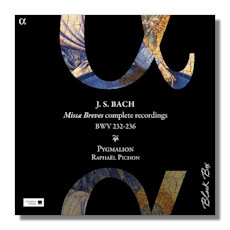
The Internet's Premier Classical Music Source
Related Links
- Bach Reviews
- Latest Reviews
- More Reviews
-
By Composer
-
Collections
DVD & Blu-ray
Books
Concert Reviews
Articles/Interviews
Software
Audio
Search Amazon
Recommended Links
Site News
 CD Review
CD Review
Johann Sebastian Bach

The Complete Missae Breves
- Motet "Der Gerechte kommt um" (Bach/Kuhnau)
- Motetto "O Jesu Christ, meins lebens Licht", BMV 118
- Missa Brevis, BMV 233 **
- Missa Brevis, BMV 234 ***
- Missa Brevis, BMV 235 ***
- Missa Brevis, BMV 236 **
- "Missa 1733", BMV 233a (Original movements of Mass in B minor) *
Eugénie Warnier, soprano
Emiliano Gonzalez-Toro, tenor
* Anna Reinhold, soprano
* Carlos Mena, alto
** Terry Wey, alto
*** Magid Et-Bushra, alto
*** Sydney Fierro, baritone
** Christian Immler, baritone
* Konstantin Wolff, bass
Pygmalion/Raphël Pichon
Alpha 816 3CDs
Even if you hate Bach, hate masses, hate religious music, or the world in general, this might just change your mind. These delightful creations open our eyes to some spectacular achievements in sacred music. Known as the Missa Brevis or the "Lutheran Masses" they are cast in six movements each and reaffirm Bach's claim as one of the greatest composers of all time. Not only that, but the performances are uniformly excellent; the playing, singing, and pacing from the podium leave little to be desired.
Everything, and I mean everything, goes right. The instrumentals are vibrant and historically informed, but never rushed or ugly. The choral singing is bright, clear, and assertive. You can basically take Latin (or in the Kyrie movements, Greek) from these singers. Better yet, the brief nature of these works means that – even for Bach – they are tightly-knit and masterfully focused. If you find his cantatas and large-scale works to be a challenge, try these. The same sincerity of purpose and giving spirit informs these shorter works, and few have realized that better than Pygmalion. So often, Bach is treated coldly and objectively, an exercise in fugal writing that is as precise as it is joyless. One of the reasons I don't review much Bach, aside from my general preferences for the late Romantics, is that Bach so rarely sounds like anybody is having a good time doing it. Naturally, these deeply spiritual works have a certain weight and solemnity that cannot and should not be avoided, but neither is it a lab experiment.
And so it pleases me greatly to say how genuine these performances are. The soloists are all wonderfully warm and expressive, with the same amount of care and detail as the chorus. The Pygmalion orchestral forces are small, but also intensely focused and very cohesive. Individual voices are appreciably audible, while each section works together to highlight the many harmonic beauties these works hold. Conductor Raphël Pichon paces each work with grace and naturally flowing tempos. There's excitement when needed, but nothing is ever stop-and-start. It sounds right, it feels right, and you'll love it.
Disc three is perhaps the best way to sum up this set's considerable strengths. Yes, it's only the opening two movements of what would later become the great Mass in B minor, but that's all Bach needed for the occasion (an audition for a job, of all things). That will keep you humble, no? At any rate, we're lucky to have it, especially is such a revelatory performance as here. Never have I heard this music so clearly, so unhurried yet light. Old-fashioned performances turn these opening movements into a dirge, while modern ones race ahead and clip phrases like overgrown hedges. This is a perfect balance, tremendously fine choral work married to playing of the utmost care. It's joyful, joyful music making that ends as fine a Bach box as ever. There are no liner notes, and I am totally in agreement with other critics who deem this unacceptable. It is, especially with a full-priced box of unfamiliar music. But if you can look past that – and I suggest you do – you'll have hours, even years of enjoyment on your hands.
Copyright © 2014, Brian Wigman




















